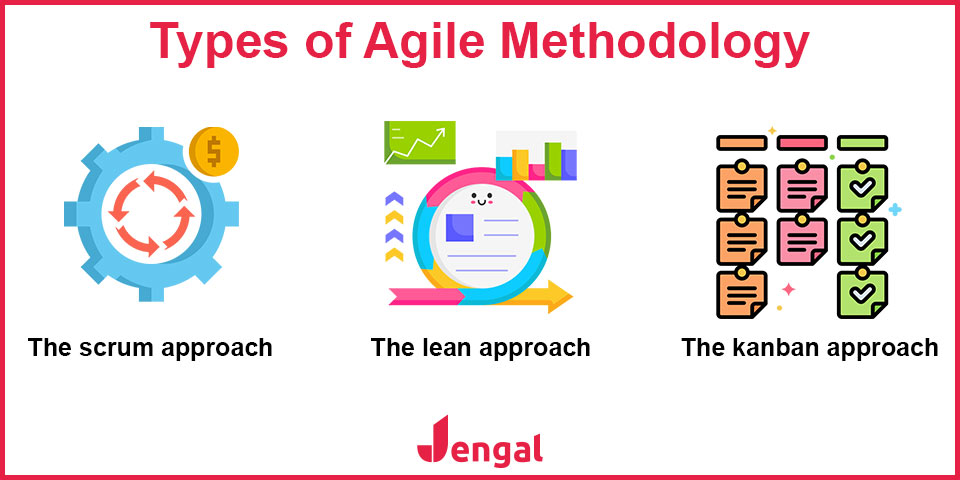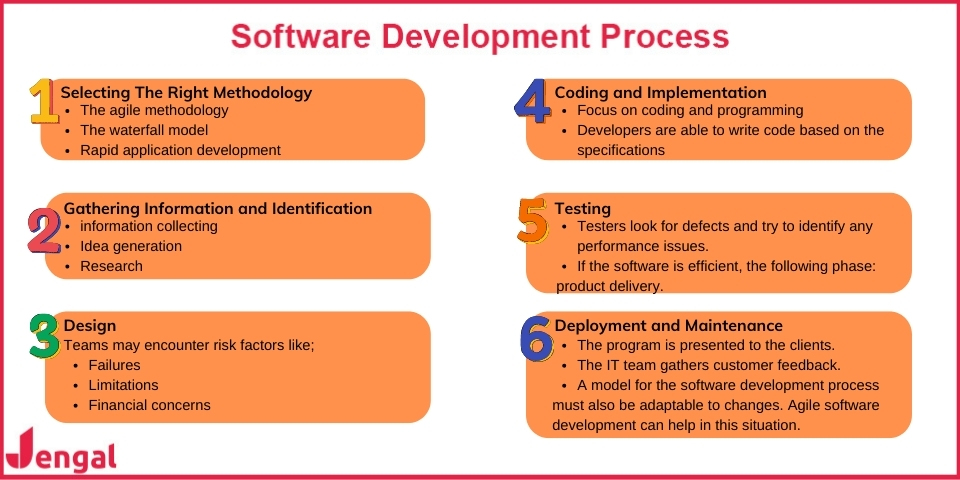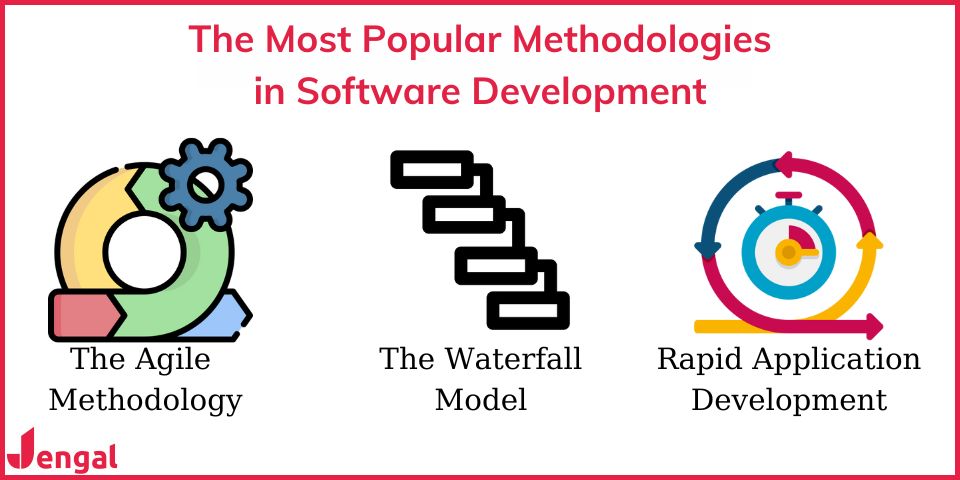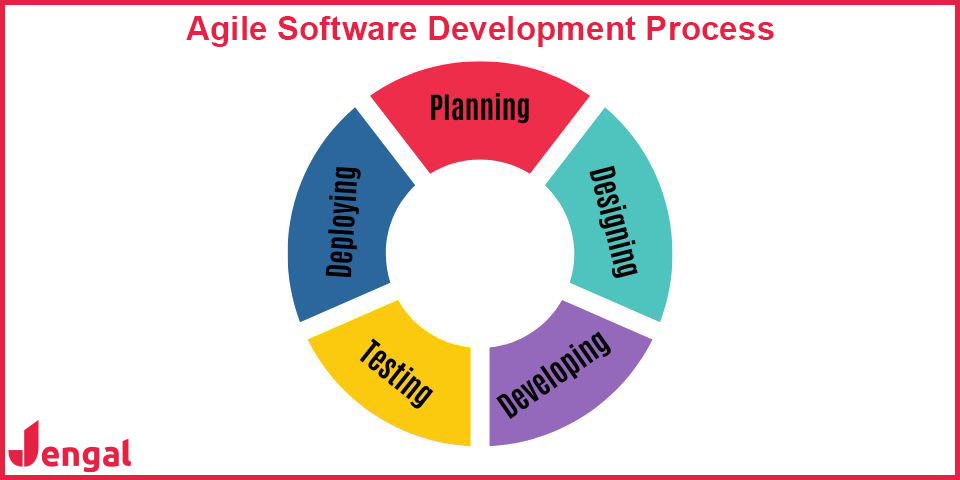As technology progresses, we see project managers and their teams gradually abandon traditional models in favor of modern ones. The field of software development is also impacted by this need to adapt to change.
Software development is, without a doubt, among the top industries when it comes to embracing change and creating innovative business models. In light of this, it can be challenging to deny the expectations and the necessity of providing the project teams with a more open and interactive environment. Because of this, the agile methodology is now more commonly used in software development than traditional models.
Agile software development is one of the most effective methods for satisfying customer needs by adjusting to changes, pushing the limits, and boosting software development. Due to this, we will examine the definitions of the agile methodology and software development in this article. We’ll also go over agile software development and how it can be utilized.

Table of Contents
What Is Agile Methodology?
The term “agile” refers to a proactive approach to dealing with uncertain situations and adapting to change. Agile methodology is a technique that promotes testing and development that are continuously evolving throughout the software development process.
Agile methodology, related to software development, emphasizes flexible, quick, and adaptive planning. It is a method of thinking about the changing variables rather than merely concentrating on the traditional waterfall approach.
According to this methodology, the “plan, design, build, test, and deliver” process from the conventional model may be effective for product development. However, the software development process cannot be conducted using the conventional methodology. If you want to implement this methodology, you can learn more what is agile project management.
The agile methodology emphasizes factors like people, quality, and results and contends that it is impossible to avoid facing a challenge or a change head-on. Being flexible and continually testing the results-focused process are therefore crucial aspects of this methodology.

Types of Agile Methodology
Software developers pay close attention to the three primary types of the agile methodology. These three agile methodologies are known as scrum, lean, and kanban. These three types offer a way to apply the agile methodology when it comes to implementation.
The scrum approach
To produce a product that meets the participants’ demands, the scrum technique involves breaking the classic waterfall model process down into smaller sections and enabling the teams to work together and access the software.
There are 7 to 9 members on a scrum team. The team takes on their roles, often meets to encourage interaction and product improvement, and values consumer feedback.
The lean approach
The lean methodology aims to enhance the development process. It implies that teams should focus on increasing process efficiency and waste reduction to provide customer value. It has knowledgeable team members who collaborate fully in a respectful environment.
The lean approach team goes beyond the typical model’s conceptual framework and concentrates on locating the issue by investigating its root causes. The group looks for an effective and long-lasting answer.
The kanban approach
On the other hand, the kanban method emphasizes visualizing the job and lowering the amount of time it takes to complete it effectively. This strategy emphasizes the concepts of “time” and “work efficiency,” potentially improving the quality.
Instead of spending a long time to complete a task, the kanban technique enables teams to produce work continuously and receive feedback. By doing this, they can provide customers with value more quickly.
An Introduction to Agile Software Development
Now that you are aware of what agile methodology is, you can see why it is more popular in the software development process. Before getting started with the agile software development process, it is important to clarify what software development is and how it is performed so that there are no misunderstandings.
Defining software development will be the initial step. Building computer programs is the process of software development. Its focus is on developing, deploying, and maintaining software. Software development provides guidelines for software development teams to create high-quality software.

Software Development Process
The software development process aims to create high-quality software and computer applications. It concentrates on phases that form the software development lifecycle, such as research and deployment.
The steps involved in creating software normally are as follows:
Selecting The Right Methodology
One of the most critical decisions to make, if not the most vital, is which approach to use when developing software. With the correct technique, you’ll be able to see the entire procedure and get a sense of how your team will operate.
This is why it’s important to consider various aspects before selecting a methodology, including deadline expectations, the amount of time that work is typically in progress, team members’ perspectives, client expectations, and environmental conditions. You may choose the best methodology for your software development plan by considering these aspects.

The agile methodology, the waterfall model, and rapid application development are some of the most popular methodologies in software development.
Gathering Information and Identification
Understanding client expectations and gathering data to create a plan based on them are crucial steps in the software development process. This process involves information collecting, idea generation, and research.
IT teams may conduct surveys, observe the market, and perform a SWOT analysis on the product to determine its strengths and weaknesses to determine the customers and the market’s expectations. Based on the research, the team may decide on the solutions and receive the responsibilities they will play during the design and execution phases.
Design
Teams begin the software development process at this stage. They construct an architecture to determine the type of software that will be developed. In this phase, the software is developed using the blueprint created by the architects.
Teams may encounter risk factors like failures, limitations, and financial concerns during the design process. Thanks to the architects’ template, developers and testers can complete the design with the least amount of risk.
Coding and Implementation
Coding and implementation come next after product design. Software engineers concentrate on coding and programming at this phase. Developers are now able to write code based on the specifications and guidelines provided in the previous stage.
Testing
One of the most crucial phases of the software development process is testing, which verifies the software’s faults. During testing, testers look for defects and try to identify any performance issues. If they confirm that the software is efficient, they move on to the following phase: product delivery.
Deployment and Maintenance
When testing is complete, and no errors are discovered, the software is ready for use by customers. The program is presented to the clients and made available to them during the deployment phase.
Artificial intelligence (AI) is a system that enables machines to perform human-like tasks, learn from experience and adapt to new inputs. However, ev...
Software development has become an important and indispensable profession with the advancement of technology day by day. Software goes beyond sectors,...
The IT team gathers customer feedback and keeps track of how they respond to the product during this phase. They also look for any problems users are having with the product. Additionally, they concentrate on updating the software and resolving minor issues to ensure the system functions properly while keeping an eye on how the product is being used.
Therefore, the most challenging aspect of creating effective software is meeting the expectations of the clients and team leader. For this reason, a model for the software development process must also be adaptable to updates and changes. Agile software development can help in this situation.
Agile Software Development Process

As we just mentioned, the important components of the software development process are reacting to environmental changes, customer expectations, and the product itself. Being aware of the significance of the agile methodology in the software development process is, therefore, a must.
The agile software development process is a collection of methodologies that emphasizes developing a lifecycle where there is more focus on working for a brief time with team collaboration and continuous planning, testing, and delivery rather than adhering to the traditional model to go through step by step for a long period to deliver it all at once.
Similar to the software development process, the agile software development process includes the following steps while being developed:
- Planning
- Designing
- Developing
- Testing
- Deploying
The distinction between these processes is that developers, testers, and other team members may have to deal with adaptive change, ongoing testing, and delivery. The agile software development approach emphasizes people, interpersonal connections, and teamwork among developers, customers, and other clients.
Agile software development places the highest priority on everyone being aware of what others are doing throughout the software development process. Team members should communicate with one another and attend meetings. There should also be continuous feedback, and changes should be made based on this feedback. The cornerstone of agile software development is the trust that is established between the team and the clients.
Conclusion
As a wrap-up, we should note that the agile methodology we discussed in this article originated with software projects and has since grown to be a crucial example for software developers. Agile software development defies the traditional model’s limitations from project initiation to implementation, promoting software development by providing teams more flexibility and engagement while adjusting to change.
Therefore, we have defined “agile” and “agile software development” in this article. To help you better comprehend the subjects, we looked into the software development process and agile software development. We hope this article adequately explains the agile software development process and its benefits to you.




No comments to show.